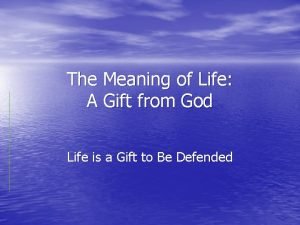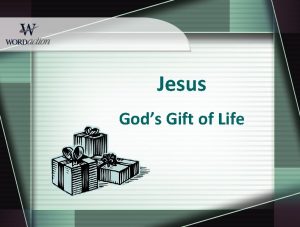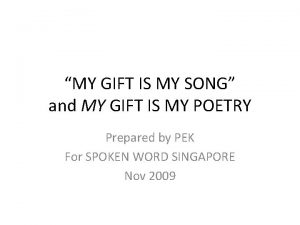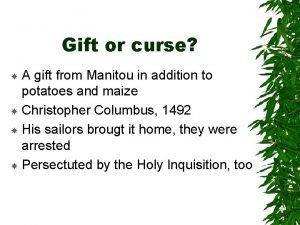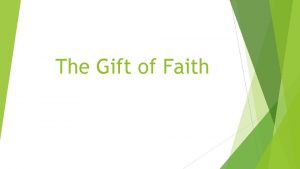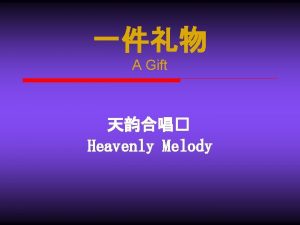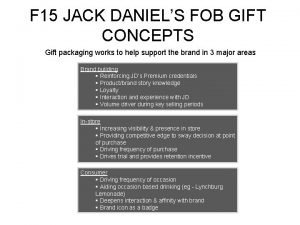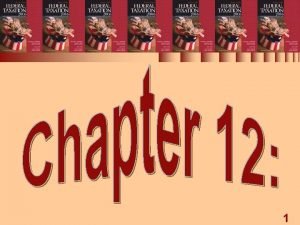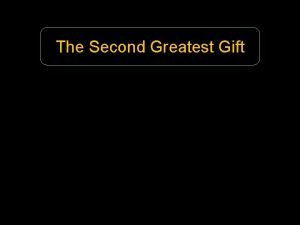THE GIFT OF LIFE AND THE GIFT OF





























- Slides: 29

THE GIFT OF LIFE AND THE GIFT OF LEARNING: HOW CHRISTIAN ANTHROPOLOGY COULD INFORM A CHURCH OF IRELAND THEOLOGICAL VISION FOR EDUCATION Ceist Conference – 26 th September 2019 Linda Rainsberry

Setting the Scene

Archbishop Robert Runcie (Archbishop of Canterbury, 19801991) • The Anglican Church is “not a church of hard edges” quoted in Jeff Astley, “Anglican Perspectives on Christian Religious Education” Theo-Web 13, no. 2 (2014): 79.

Anglicanism holds to being a “broad Church” This Photo by Unknown Author is licensed under CC BY § But the “middle of the road can be a dangerous place to travel” and “the top of the fence an uncomfortable place to sit” Jeff Astley, “Church Schools and the Church’s Service for the Poor” in Anglican Church School Education: Moving Beyond the First Two Hundred Years, ed. Howard J. Worsley, (London: Bloomsbury Academic, 2013), 82.

The start of it all

Getting off on the wrong foot • When we speak of God, we habitually start with ourselves; with what God expects of us • Early catechism: Why did God make you? To know, love and serve him • Apostles creed: “I believe in God…. ”

• Christian Anthropological View of Life as Gift • The difference between viewing our lives as Christian Anthropology something which we possess, as distinct from something which we continually receive • Our worth is not earned; it is a given

In the beginning…. .

Creation Ex Nihilo • God creates from nothing • God gains nothing by the act of creation • God creates humankind in God’s own image and likeness • God gifts humanity with free will • God enters into our very humanity in the Incarnation • Life is pure gift

Creation Ex Nihilo • “God is not restricted in his creating by the characteristics of some pre-existent material stuff. Creation ex nihilo therefore, preserves the divine freedom in the act of creating. ” Simon Oliver, Creation: A Guide for the Perplexed (London: T&T Clark, 2017), 47. • The “act of creation involves no movement or change in God. We need to strip any idea of effort from the ‘act’ of creation”. Creation is “more like an inner act of willing than an external act of craftmanship. ” John Webster, “’Love is also a Lover of Life’: Creation Ex Nihilo and Creaturely Goodness, ” Modern Theology 29, no. 2 (April 2013): 162. • The world is “the image of God that God throws off simply by being God, like the projection of a shadow”. Kathryn Tanner, “Creation Ex Nihilo as Mixed Metaphor, ” Modern Theology 29, no. 2

• We don’t possess thing called being, rather we exist by participating in God’s Being. • Thus, we stand somewhere between the source of our being (God) and absolute nothingness. John Macquarrie, Principles of Christian Theology, 61 and 215. • How do we understand this participation? • Augustine: “your eyes participate in light and see. If you close your eyes, the light is not diminished; if you open them it is not increased. Paul Griffiths, Intellectual Appetite, A Theological Grammar (Washington D. C. : The Catholic University of America Press, 2009), 29. Existence

Image and Likeness § On each of the first five days of creation; God declared that “It was good”. On the sixth day, after creating humankind, God declared it to be “very good”. (Gen. 1: 31) § “Creation reaches a climax when God makes something that reflects him more fully than anything else – beings capable of choice and of love”. Rowan Williams, Tokens of Trust, (Norwich: Canterbury Press, 2007), 42. § The imago Dei is more “a potentiality for being that is given to man than a fixed nature. ” John Macquarrie, Principles of Christian Theology (London: SCM Press, 1977) 231 § Human life is “a progression from the potency of the image to the fulfilment of the likeness”. John Macquarrie, In Search of Humanity, 23

Freedom § “Freedom is not created by God, it is part of the nothing out of which God created the world…. Freedom is the empty space, the room that is still left for manoeuvre and has not yet been filled up and determined. ” § We tend to see others, including God, as standing in the way of our freedom. Nothing could be further from the truth. § “God is so far from being the enemy of freedom that he is its author” John Macquarrie, In Search of Humanity (London: SCM Press Ltd. , 1982)

Incarnation • “And the Word became flesh and dwelt among us”. (John 1: 14) • By the Incarnation, God “plunges in more deeply and identifies in a new way with creation” Macquarrie, In Search of Humanity, 152. • “Creator and creature become one in the incarnation. ” This is so because the possibility (or even the purpose) is “already there in creation. ” Macquarrie, Principles of Christian Theology, 220. • God answers our question, who is God; quid sit Deus? God (literally) gives us a Word to speak of him. • Jesus, in his life and ministry, embraces the “ordinary and the limited … In this divine embrace of the ordinary, we see the deepest paradox that only the Creator can exhibit fully what it is to be a creature. ” Rowan Williams, Christ, The Heart of Creation, (London: Bloomsbury Continuum, 2018), 236 -239.

Creation is a “purely free, completely unique, totally gratuitous and wholly unnecessary act. ” Oliver, Creation, A Guide for the Perplexed, 37. Life as Gift

Where do we land? Might we not have achieved something, as Christian educators, if, in response to the question, “Why did God make you? ” pupils learned to respond, “To show me that He knows and loves me”; and that when reciting the creedal words, “I believe in God”, they might have learned, with equal confidence, to say, “God believes in me”?

A Firm Place to Stand • Education involves more than simply learning • Pupils need to learn to make judgements about the meaning and significance of what they learn. • Trevor Cooling, Doing God in Education, 2010 • Pupils can interpret their lives through a secular understanding or a Christian understanding of what it means to be human. • The Christian understanding of what it means to be human underpins what Christian education is about.

Control Through our own efforts we can excel Autonomy is the accepted ideal Nowadays, the view is often that “the best relationship you can be in with the world is in control. ” Rowan Williams, Being Human, 2018. Charles Taylor, the “buffered self” – “uses reason to consider without passion the value of all the perfections of body and soul that can be acquired by our conduct [… and to] choose the better. ” Taylor, A Secular Age, (Cambridge, Mass. : Harvard University Press, 2007), 135. Yet, if our value and worth is determined by our own efforts and achievements, what does it mean to fail?

Dependence • “The basic meaning of creatureliness is dependence. ” Macquarrie • Dependence in human affairs is a complex subject. We are afraid of it. There is a strong attraction in the human psyche towards the “illusion of omnipotence”. Williams, On Christian Theology, 69. • Within the life of the Trinity, God’s love is both a giving and a receiving, an initiative and a depending. • The picture of divine life involving receiving as well as giving, depending as well as controlling isn’t an easy message for a world in love with the ideal of absolute self-sufficiency. Williams, Tokens of Trust

Vulnerability • We share a vulnerability as well as a dignity with the rest of humanity. • This vulnerability invites us into relationship with one another; we learn to love others in a human way as “fragile fellow creatures held in the love of God. ” • Rowan Williams, Holy Living: The Christian Tradition for Today, (2017). • As we learn to pray for our “daily bread”, we are reminded that our need for nourishment is not a failure but a place of dignity. • Rowan Williams, Being Disciples, (2016).

Implications of Understanding Life as Gift • A positive Christian anthropology has significant implications for our understanding of the human person. • We see that our worth is not earned, it is a given. • Our very breath is given to us. • Instead of seeing our life as purely contingent on our own efforts and exertions, we come to see ourselves as held by Him in whom “we live and move and have our being” (Acts 17: 28)

Our worth is not earned; it is a given • “There is a level of affirmation bringing us into, and holding us in existence, which we do not have to work for” Rowan Williams, Being Human: Bodies, minds, persons, (London: SPCK, 2016), 72 • Our worth “is not and cannot be either earned by us or eroded by others” Rowan Williams, On Christian Theology, (Oxford: Blackwell Publishing, 2000), 72.

The Gift of Learning • The maker of heaven and earth is as intimately involved with our becoming, as with our coming to be William Desmond, God and the Between (Oxford: Blackwell Publishing, 2008), 248 -249. This includes our striving to grow in knowledge and wisdom, in trust and right relationship and in our search for truth. This accounts for the central importance which the church has, for centuries, ascribed to its educational ministry.

Attention • A Christian understanding of education necessarily involves an attentiveness to what is already there in creation; to the given and the found. • Attention is a kind of waiting on the truth, a receptivity to how people and things really are. • It is an orientation, not a practice or an achievement. • We ought not to look at, for example literature, so as to try to interpret it; but rather to pay attention to it until the light suddenly dawns. • Example of seeing a deer when driving at dusk…… • The “divine depth dimension”. • drawn from work of Simone Weil, as discussed in Angelo Caranfa, “The Aesthetic and Spiritual Attitude in Learning: Lessons form Simone Weil, ” Journal of Aesthetic Education 44, no. 2 (Summer 2010): 63 -82. )

Attention - continued: • “The challenge of a Catholic school may thus be not so much in teaching as in not teaching but rather creating space that is reflective, free and open to grace” David Albert Jones and Stephen Barrie, Thinking Christian Ethos: The Meaning of Catholic Education (London: CTS Publications, 2015), 78.

Allowing • Effort and effect: ”Effects are, in a grace-haunted world, unpredictable and disproportionate to effort” Rowan Williams Deep within each person is “the very core of our freedom. Inevitably, each child will surprise us with ideas and projects born of that freedom. ” (Amoris Laetitia 262) There is a “disproportion between our actions and their effects. We know that we do not own the gift, but that its care is entrusted to us. ” (Amoris Laetitia 287)

Allowing - continued: • ”Christianity sees education as making progress…through…untidiness: through weakness and failure as well as strength and success, through spontaneity as well as planned activity, by accident (that is, by providence) as well as by pedagogical design. ” • Jones and Barrie, Thinking Christian Ethos: The Meaning of Catholic Education (Oxford: CTS Publications, 2015), 95 • In terms of effective teaching; all pupils “are more delighted and moved by what they find out for themselves. ” • “When it comes to motivation, the switches are on the inside” • (Chris Lowney, Heroic Leadership, (Chicago: Loyola Press, 2003), 115. )

Church of England: Vision for Education Deeply Christian, Serving the Common Good (2016) • Central theme is Jesus’ promise of “life in all its fullness” (John 10: 10). • Four core elements of an ‘ecology’ of the fullness of life: • Wisdom • Hope • Community • Dignity

Theological Underpinning of Education The Church of Ireland might borrow some confidence from its nearest neighbour so as to underpin and justify its continued role in education A core element of this ought to be the Christian anthropological understanding of life as gift, of our worth as a given. The doctrine of creation has shown us that life is God-given, understood in both senses of that phrase. The giveness of our life and worth serves to counteract our fear of dependence and vulnerability. Education viewed through the prism of gift is of a different hue than education approached as pure task. Christian educators can intentionally realise a greater degree of freedom and ‘allowing’ in teaching their pupils and trust that they will afford those pupils the greatest opportunity to develop their God-given talents. In this fashion, the given gift can be received.
 Life is a gift from god
Life is a gift from god A bundle of joy nativity script
A bundle of joy nativity script Hình ảnh bộ gõ cơ thể búng tay
Hình ảnh bộ gõ cơ thể búng tay Slidetodoc
Slidetodoc Bổ thể
Bổ thể Tỉ lệ cơ thể trẻ em
Tỉ lệ cơ thể trẻ em Chó sói
Chó sói Thang điểm glasgow
Thang điểm glasgow Bài hát chúa yêu trần thế alleluia
Bài hát chúa yêu trần thế alleluia Kể tên các môn thể thao
Kể tên các môn thể thao Thế nào là hệ số cao nhất
Thế nào là hệ số cao nhất Các châu lục và đại dương trên thế giới
Các châu lục và đại dương trên thế giới Công thức tính thế năng
Công thức tính thế năng Trời xanh đây là của chúng ta thể thơ
Trời xanh đây là của chúng ta thể thơ Cách giải mật thư tọa độ
Cách giải mật thư tọa độ Làm thế nào để 102-1=99
Làm thế nào để 102-1=99 độ dài liên kết
độ dài liên kết Các châu lục và đại dương trên thế giới
Các châu lục và đại dương trên thế giới Thơ thất ngôn tứ tuyệt đường luật
Thơ thất ngôn tứ tuyệt đường luật Quá trình desamine hóa có thể tạo ra
Quá trình desamine hóa có thể tạo ra Một số thể thơ truyền thống
Một số thể thơ truyền thống Cái miệng xinh xinh thế chỉ nói điều hay thôi
Cái miệng xinh xinh thế chỉ nói điều hay thôi Vẽ hình chiếu vuông góc của vật thể sau
Vẽ hình chiếu vuông góc của vật thể sau Thế nào là sự mỏi cơ
Thế nào là sự mỏi cơ đặc điểm cơ thể của người tối cổ
đặc điểm cơ thể của người tối cổ V. c c
V. c c Vẽ hình chiếu đứng bằng cạnh của vật thể
Vẽ hình chiếu đứng bằng cạnh của vật thể Tia chieu sa te
Tia chieu sa te Thẻ vin
Thẻ vin đại từ thay thế
đại từ thay thế
